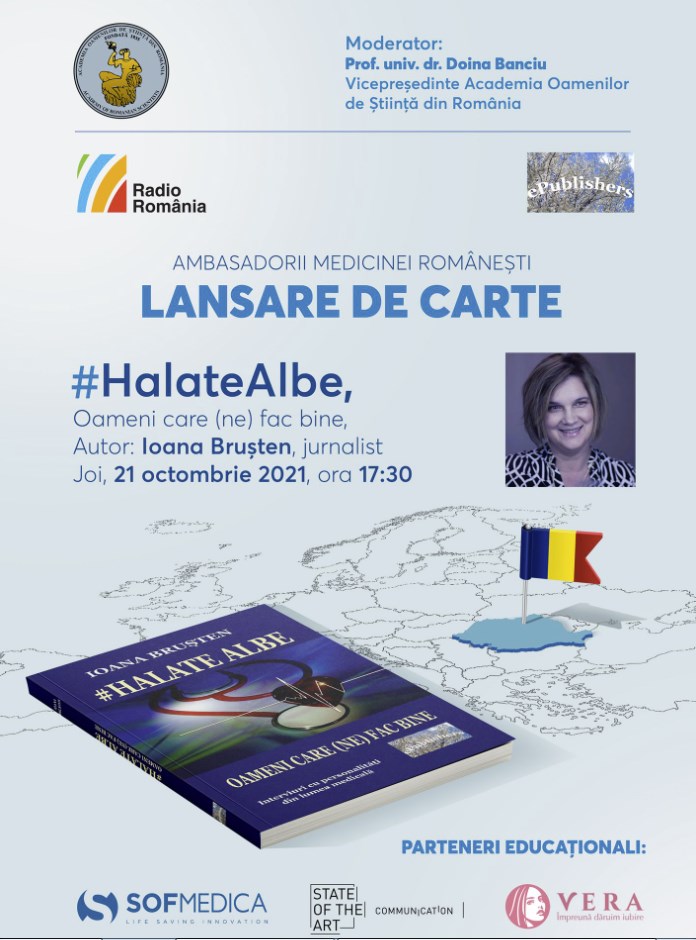15 May 2019, 16.00 – Academy of Romanian Scientists, Human Rights Hall
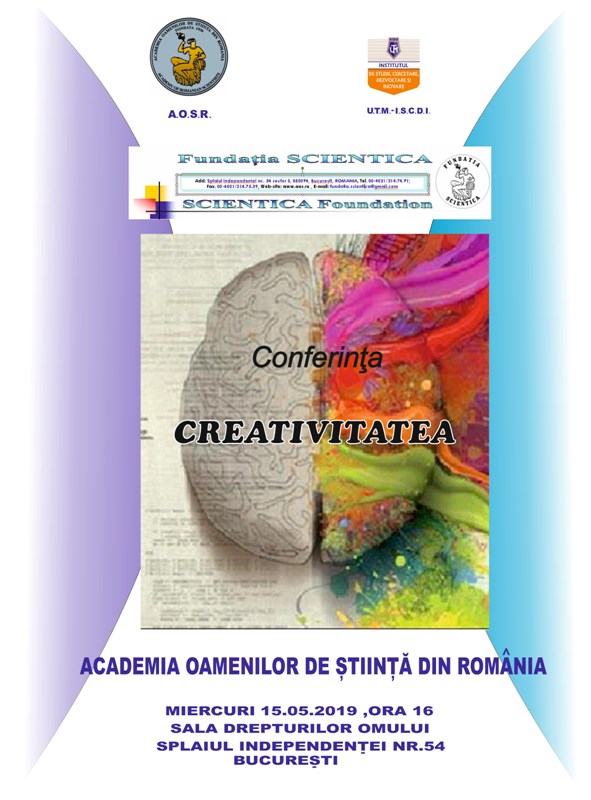
15 May 2019, 16.00 – Academy of Romanian Scientists, Human Rights Hall

VALENCIES OF WOMEN – 24 April 2019, 16.00 – Academy of Romanian Scientists, Human Rights Hall
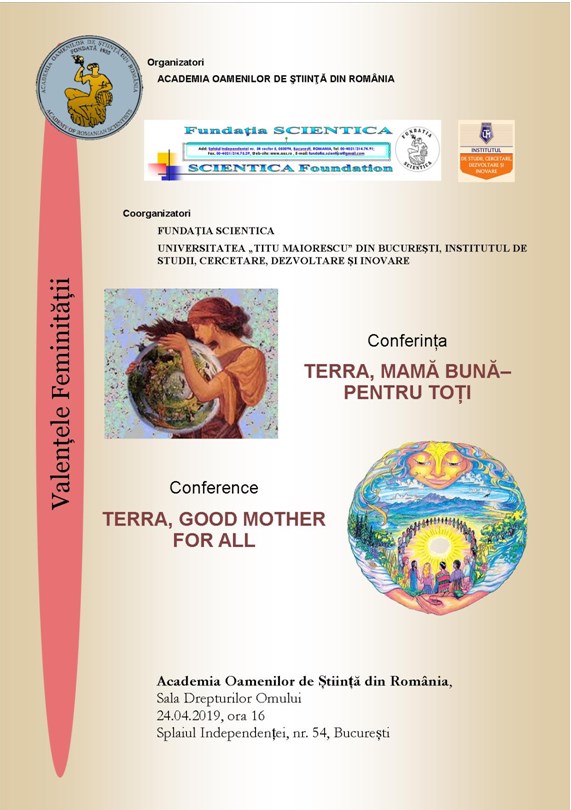
THE VALENCIES OF FEMINITY – The Academy of Romanian Scientists organizes the course Communication, Connection and Influence with John Maxwell Team
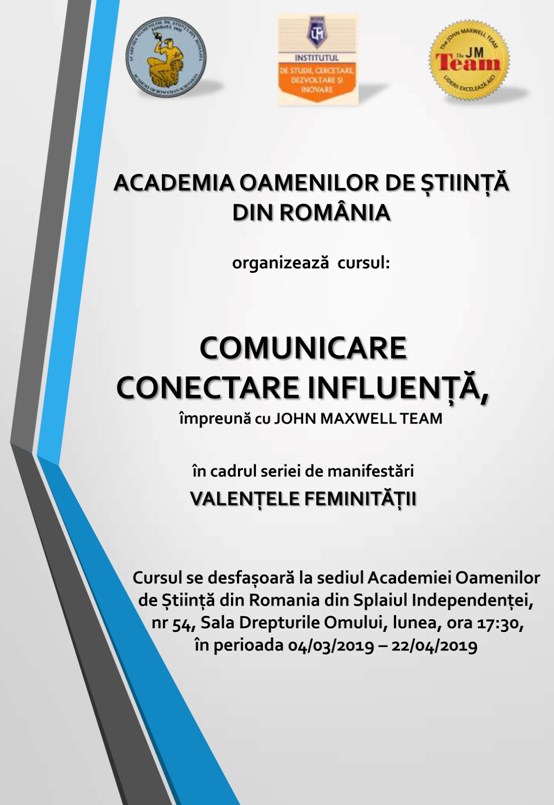
VALENCIES OF WOMEN – 28 March 2019, 18.00 – Aula of the Academy of Romanian Scientists
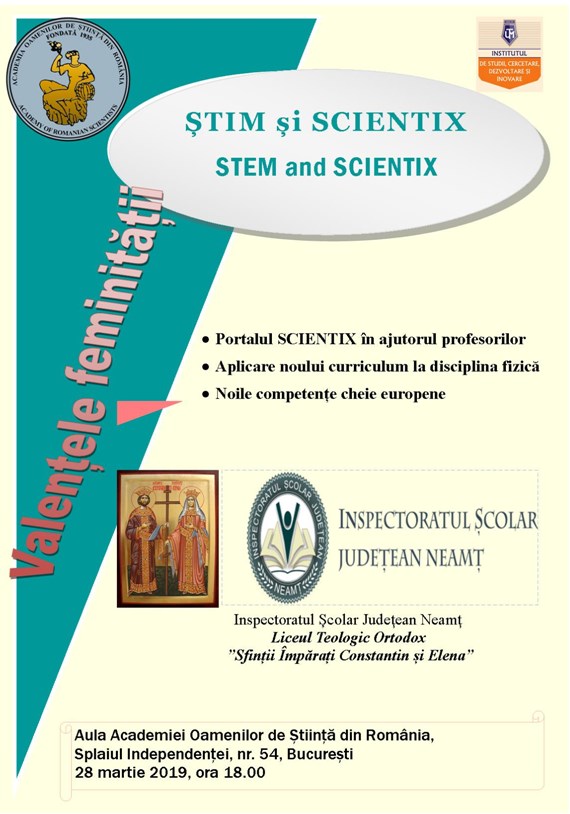
Collaboration with JOHN MAXWELL TEAM, Mastermind from 7 March to 18 April 2019
– THE VALENCES OF FEMININITY –
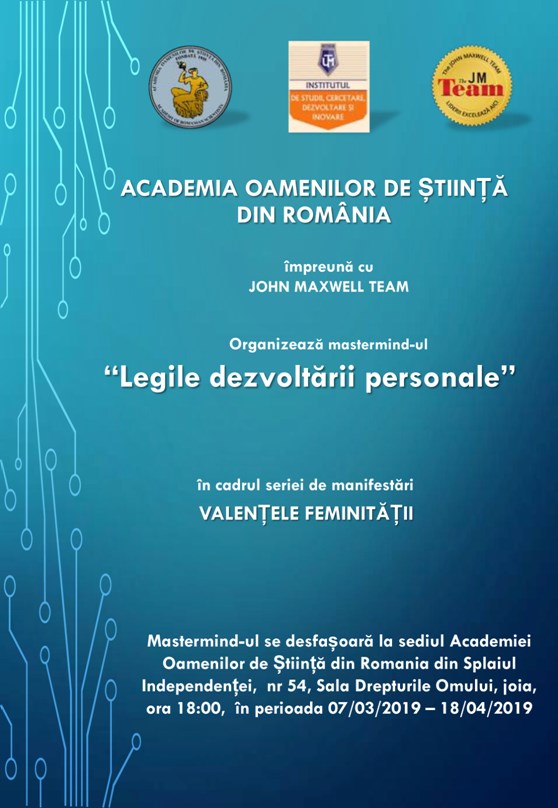
Science & Technology Association invites you to the conference Science and Imagination held by Professor Alexandru Mironov on 21 February 2019, at 18.00, in the Aula of the Academy of Romanian Scientists – Splaiul Independenței no. 54, Bucharest, Romania.
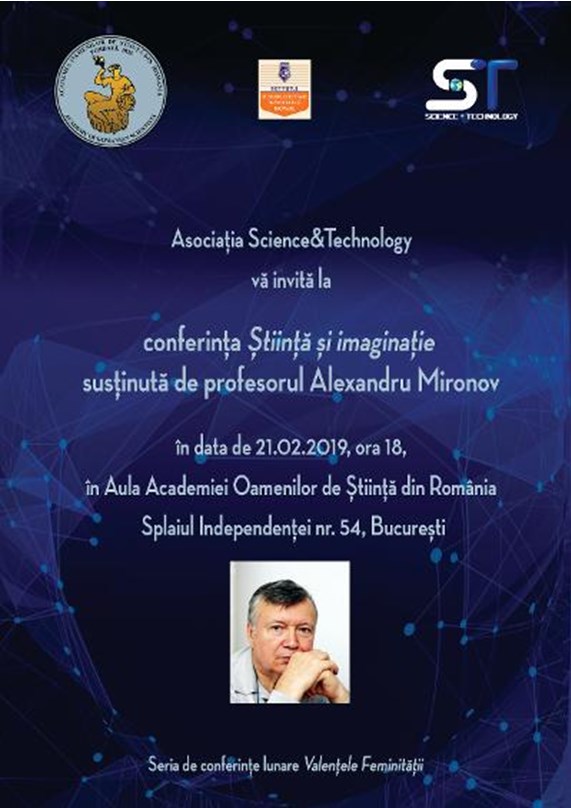
– VALENCIES OF WOMEN – 30 January 2019, 16.00 – AOSR Headquarters – Splaiul Independenței no. 54 –
Education for science, technology, engineering and mathematics – STEM education
European policies supporting education – STEM/STEM
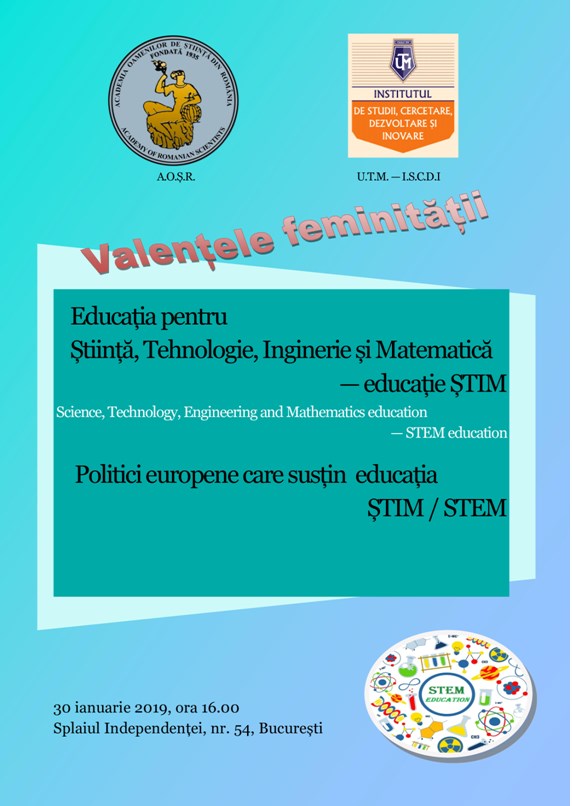
The Centre for Research on the Cooperation between the Orthodox Church and the Romanian Army “General Paul Teodorescu”, founding director Prof. Valentin Ciorbea, corresponding member of the AOȘR, is organizing two special events at the Dintr-un Lemn Monastery on 8 and 9 July 2022.
On July 8, 2022 the National Symposium “The Church and the Romanian Army. The traditions of the Conciliation” – 9th Edition. Academics and professors from the pre-university education, museographers, archivists, military and priests will present the fruits of scientific research.
The program of the symposium also includes the launch of the magazine Missione, year IX, 2022, the periodical of the center that appears under the aegis of the Academy of Romanian Scientists and the Archdiocese of Ramnic. There will also be book presentations.
The next day, on 9 July 2022, will be commemorated General Paul Teodorescu (1888-1981), member of the AOȘR – correspondent since 21.12.1935 and titular since 27.05.1938. The bust of the general will be unveiled, a work of art made by the master Valentin Tănase, at the request of the 30th Guards Brigade “Mihai Viteazul”, as a sign of appreciation for the former commander of the unit between 1928-1932, who linked the unit to the Holy Monastery through the contribution of the craftsmen of the Guards Regiment to the restoration of the chapel.
Placed in the park of the Holy Monastery next to the Air Force and Navy monuments, the bust of the General certifies a historical reality, resumed in the last 10 years by the presence of the military of the 30th Guards Brigade “Mihai Viteazul” at the events organized here. At the same time, the Wooden Monastery became a de facto place of worship and remembrance for the soldiers of the illustrious and appreciated unit.
The Academy of Romanian Scientists honors General Paul Teodorescu for his contribution to the organization of the events of two members, Dr. Varsanufie, honorary member of AOȘR and Prof. Valentin Ciorbea, corresponding member of AOȘR.
|
MOTHER ABBESS ABBESS EMANUELA OPREA – 40 YEARS OF ABBESS AT THE MONASTERY IN A WOOD |
|
COLONEL TOMA MIHAI TUDORAN (1903-1975) – AN “ACE” OF ROMANIAN EQUESTRIANISM IN THE INTERWAR PERIOD |
|
INFORMATION REPORTS OF COLONEL PAUL TEODORESCU, MILITARY ATTACHÉ IN FRANCE (1970) |
|
THE CODICIL OF THE HOLY AND HOLY MONASTERY CALLED FROM A WOOD |
|
THE SEAL OF THE DIOCESE OF RÂMNIC PRINTED ON TWO DOCUMENTS, ISSUED IN 1844 AND 1845 |
|
THE ACTIVITY OF TULCIAN PRIESTS ON THE HOME FRONT (1939-1944) |
|
THE DEFENSIVE SYSTEM OF THE PARADOUNAVON THEMEI IN THE XI-XII CENTURIES |
|
PROF. UNIV. DR. VALENTIN CIORBEA, AWARDED BY THE ACADEMY OF SCIENTISTS OF ROMANIA |
|
TESTIMONIES GIVEN AFTER 20 YEARS OF ARCHIEVEMENT IN THE APOSTOLIC LAND OF ROMANIA BY THE SEA |
|
MEMOIRS IN A MONOGRAPHIC BOOK OF THE SOUL OF A MISSIONARY “MONK BY VOCATION” |
|
CHESARIE GHEORGHESCU, THE ERUDITE ARCHIMANDRITE AND CONFESSOR OF THE RIGHT FAITH |
|
ROUND TABLE “THE CHURCH AND THE ARMY OF ROMANIA. TRADITIONS OF COOPERATION” |
– INTERNATIONAL DAY OF WOMEN IN SCIENCE –
11 February 2022 – The values of femininity –
OCTAVIANA MARINCAȘ – Director | Research Centre – Cultural Heritage
European Institute for Multidisciplinary Research
Senior Advisor I | Ministry of Research, Innovation and Digitisation
The conference will take place online on 11 February 2022 at 16.00.
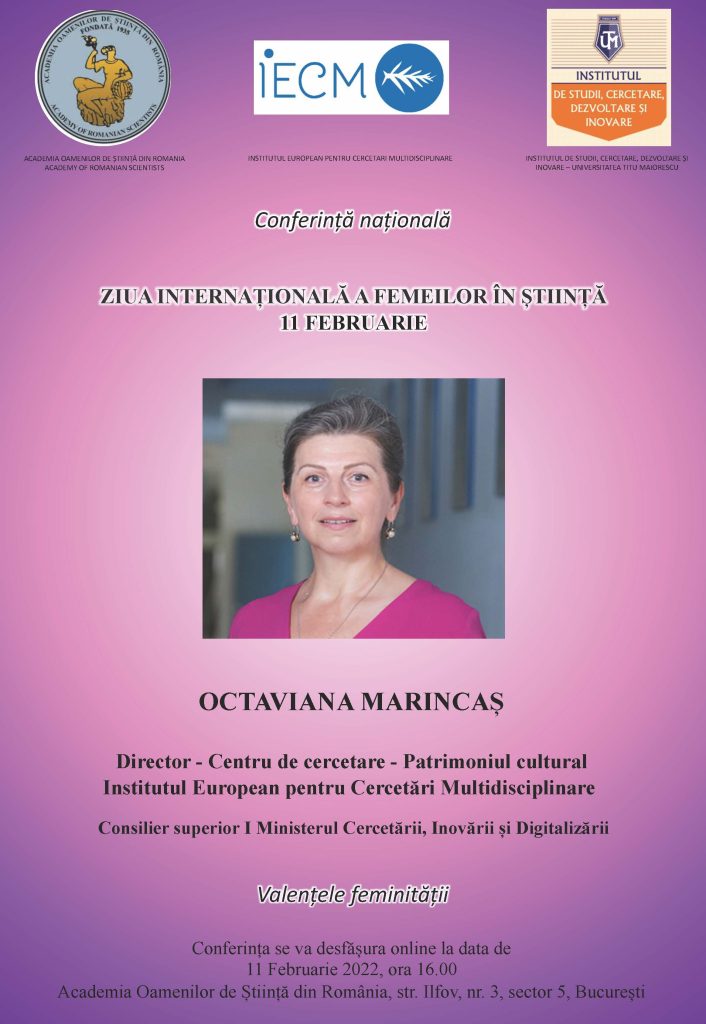
The Academy of Romanian Scientists (AOSR) organizes on Thursday 21 October 2021, at 17:30, the online launch of “#HalateAlbe, People who make us well”, which contains 108 interviews with leading personalities of Romanian medicine, author Ioana Brușten, journalist.
The event is both a tribute to the founders and the continuing physicians of the AOSR and a recognition of the excellence of contemporary medicine in Romania.
The launch will feature speeches by Acad. Irinel Popescu, Prof. Viorel Jinga, rector of the “Carol Davila” University of Faculty of Medicine in Bucharest, representatives of Radio Romania, of the publisher, as well as other personalities of medicine, present in the book to be launched.
This event is the first of a large project entitled “Ambassadors of Romanian science” through which AOSR will bring to the forefront outstanding personalities, real ambassadors of Romanian science and culture.
Moderator: Prof. Doina Banciu, Vice President of the AOSR.
